初中英语近义词辨析1
初中英语近义词辨析中考复习

初中英语近义词辨析中考复习1.clothes, cloth, clothingclothes统指各种衣服,谓语动词永远是复数,cloth指布,为不可数名词clothing 服装总称,指一件衣服用 a piece of, an article of2.f amily, house, homehome 家,包括住处和家人,house房子,住宅,family家庭成员. My family is a happy one.3.s ound, voice, noisesound自然界各种各样声音,voice人嗓音,noise噪音I hate the loud noise outside.4.p hoto, picture, drawingphoto用照相机拍摄照片,picture可指相片,图片,电影片,drawing画画.5.p opulation, peoplepopulation人口,人数,people具体人China has a large population.6.r oad, street, path, wayroad具体公路,马路,street街道,path 小路,小径,way道路,途径take this road; in the street, show me the way to the museum.7.c ustom, habitcustom传统风俗,习俗,也可指生活习惯,后接to do,habit生活习惯,习惯成自然,后接of doing. I've got the habit of drinking a lot.8.e xercise, exercises, practiceexercise运动,锻炼(不可数),exercises 练习(可数),practice(反复做)练习Practice makes perfect.9.c lass, lesson作"课"解时,两者可以替换.指课文用lesson. 指班级或全体学生用class. Lesson 6; class 5.10.officer, officialofficer部队军官,official政府官员an army officer11.work, job二者均指工作。
初中英语 近义词辨析
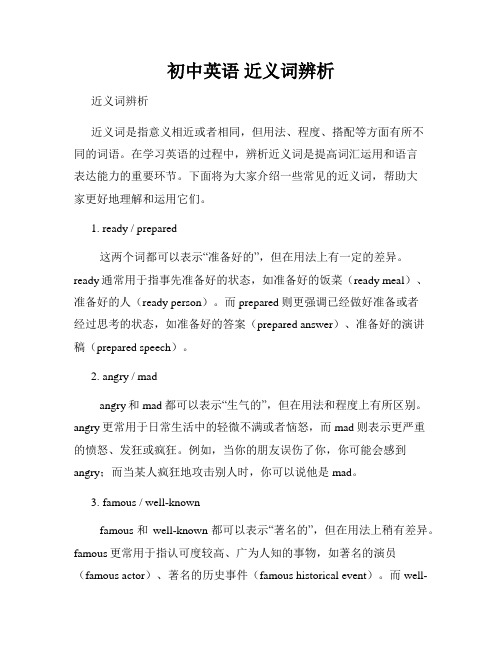
初中英语近义词辨析近义词辨析近义词是指意义相近或者相同,但用法、程度、搭配等方面有所不同的词语。
在学习英语的过程中,辨析近义词是提高词汇运用和语言表达能力的重要环节。
下面将为大家介绍一些常见的近义词,帮助大家更好地理解和运用它们。
1. ready / prepared这两个词都可以表示“准备好的”,但在用法上有一定的差异。
ready通常用于指事先准备好的状态,如准备好的饭菜(ready meal)、准备好的人(ready person)。
而prepared则更强调已经做好准备或者经过思考的状态,如准备好的答案(prepared answer)、准备好的演讲稿(prepared speech)。
2. angry / madangry和mad都可以表示“生气的”,但在用法和程度上有所区别。
angry更常用于日常生活中的轻微不满或者恼怒,而mad则表示更严重的愤怒、发狂或疯狂。
例如,当你的朋友误伤了你,你可能会感到angry;而当某人疯狂地攻击别人时,你可以说他是mad。
3. famous / well-knownfamous和well-known都可以表示“著名的”,但在用法上稍有差异。
famous更常用于指认可度较高、广为人知的事物,如著名的演员(famous actor)、著名的历史事件(famous historical event)。
而well-known则更侧重于广为人知、众所周知的事物,如众所周知的事实(well-known fact)、众所周知的地方(well-known place)。
4. continue / keepcontinue和keep都可以表示“继续”,但在用法上有所区别。
continue常用于指在某种情况下继续进行某个动作,如继续学习(continue studying)、继续工作(continue working)。
而keep则表示保持某种状态或持续进行某个动作,如保持安静(keep quiet)、持续成长(keep growing)。
近义词组辨析
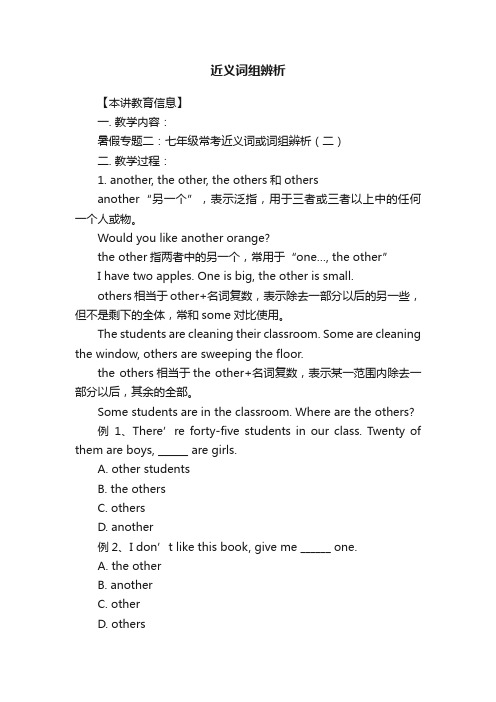
近义词组辨析【本讲教育信息】一. 教学内容:暑假专题二:七年级常考近义词或词组辨析(二)二. 教学过程:1. another, the other, the others和othersanother“另一个”,表示泛指,用于三者或三者以上中的任何一个人或物。
Would you like another orange?the other指两者中的另一个,常用于“one…, the other”I have two apples. One is big, the other is small.others相当于other+名词复数,表示除去一部分以后的另一些,但不是剩下的全体,常和some对比使用。
The students are cleaning their classroom. Some are cleaning the window, others are sweeping the floor.the others相当于the other+名词复数,表示某一范围内除去一部分以后,其余的全部。
Some students are in the classroom. Where are the others?例1、There’re forty-five students in our class. Twenty of them are boys, ______ are girls.A. other studentsB. the othersC. othersD. another例2、I don’t like this book, give me ______ one.A. the otherB. anotherC. otherD. others2. too many, too much和much tootoo many 太多……,修饰可数名词复数。
There’re too many rules in our school. I can’t stand them.too much太多……修饰不可数名词,也可以作副词使用。
初中英语近义词、同义词、词组、短语辨析大全
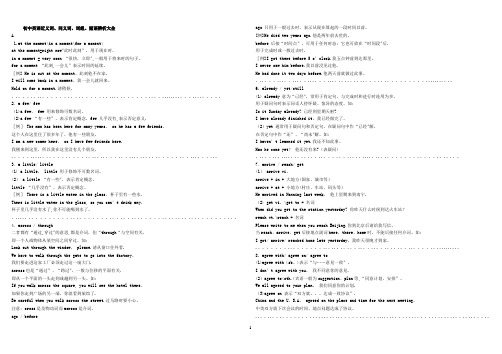
初中英语近义词、同义词、词组、短语辨析大全A1.at the moment\in a moment\for a moment\at the moment=right now"此时此刻”,用于现在时。
in a moment = very soon “很快,立即",一般用于将来时的句子。
for a moment “此刻,一会儿”表示时间的延续。
[例] He is out at the moment。
此刻他不在家。
I will come back in a moment。
我一会儿就回来。
Hold on for a moment.请稍候。
.。
.。
..。
.。
.。
.。
...。
.。
..。
........。
....。
.2.a few/ few(1)a few, few 用来修饰可数名词。
(2)a few “有一些”,表示肯定概念,few 几乎没有,表示否定意义.[例] The man has been here for many years, so he has a few friends。
这个人在这里住了很多年了,他有一些朋友。
I am a new comer here, so I have few friends here.我刚来到这里,所以我在这里没有几个朋友。
.。
.....。
.。
.。
.。
..。
..。
.。
...。
..。
.。
.。
.。
...。
..。
3.a little/ little(1) a little, little 用于修饰不可数名词。
(2) a little “有一些",表示肯定概念。
little “几乎没有”,表示否定概念。
[例] There is a little water in the glass。
杯子里有一些水。
There is little water in the glass, so you can’t drink any。
杯子里几乎没有水了,你不可能喝到水了。
初中英语同义词辨析知识点梳理
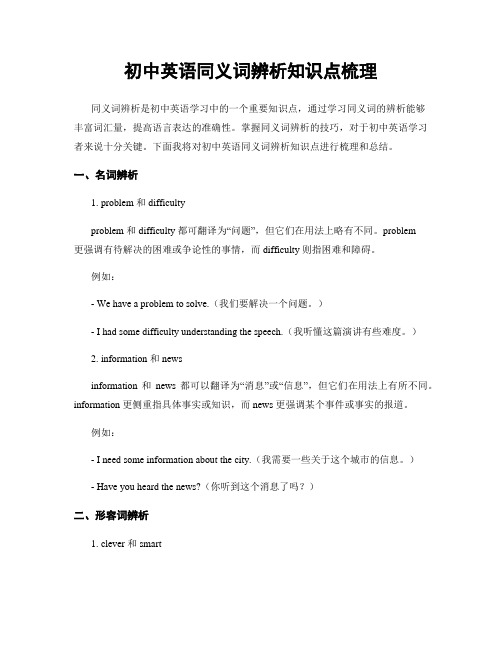
初中英语同义词辨析知识点梳理同义词辨析是初中英语学习中的一个重要知识点,通过学习同义词的辨析能够丰富词汇量,提高语言表达的准确性。
掌握同义词辨析的技巧,对于初中英语学习者来说十分关键。
下面我将对初中英语同义词辨析知识点进行梳理和总结。
一、名词辨析1. problem 和 difficultyproblem 和 difficulty 都可翻译为“问题”,但它们在用法上略有不同。
problem更强调有待解决的困难或争论性的事情,而 difficulty 则指困难和障碍。
例如:- We have a problem to solve.(我们要解决一个问题。
)- I had some difficulty understanding the speech.(我听懂这篇演讲有些难度。
)2. information 和 newsinformation 和news 都可以翻译为“消息”或“信息”,但它们在用法上有所不同。
information 更侧重指具体事实或知识,而 news 更强调某个事件或事实的报道。
例如:- I need some information about the city.(我需要一些关于这个城市的信息。
)- Have you heard the news?(你听到这个消息了吗?)二、形容词辨析1. clever 和 smartclever 和smart 都可以翻译为“聪明”的意思,但它们在用法和意义上有所差别。
clever 强调智力明晰,能够快速理解和解决问题,而 smart 则更侧重于外表和衣着得体。
例如:- He is a clever student who always gets good grades.(他是个聪明的学生,总是取得好成绩。
)- The boy looks smart in his new suit.(这个男孩穿上新衣服看起来很帅气。
)2. interesting 和 excitinginteresting 和 exciting 都可以翻译为“有趣”的意思,但它们在用法上有所区别。
英语近义词辨析
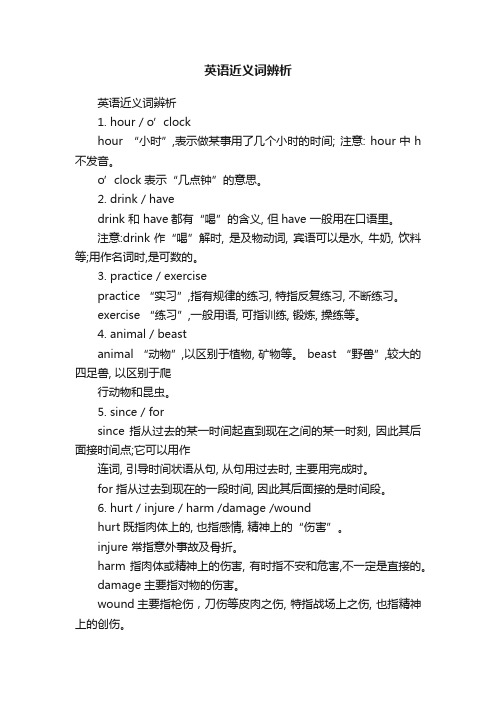
英语近义词辨析英语近义词辨析1. hour / o’clockhour “小时”,表示做某事用了几个小时的时间; 注意: hour中h 不发音。
o’clock表示“几点钟”的意思。
2. drink / havedrink 和 have都有“喝”的含义, 但have 一般用在口语里。
注意:drink作“喝”解时, 是及物动词, 宾语可以是水, 牛奶, 饮料等;用作名词时,是可数的。
3. practice / exercisepractice “实习”,指有规律的练习, 特指反复练习, 不断练习。
exercise “练习”,一般用语, 可指训练, 锻炼, 操练等。
4. animal / beastanimal “动物”,以区别于植物, 矿物等。
beast “野兽”,较大的四足兽, 以区别于爬行动物和昆虫。
5. since / forsince 指从过去的某一时间起直到现在之间的某一时刻, 因此其后面接时间点;它可以用作连词, 引导时间状语从句, 从句用过去时, 主要用完成时。
for 指从过去到现在的一段时间, 因此其后面接的是时间段。
6. hurt / injure / harm /damage /woundhurt既指肉体上的, 也指感情, 精神上的“伤害”。
injure 常指意外事故及骨折。
harm 指肉体或精神上的伤害, 有时指不安和危害,不一定是直接的。
damage主要指对物的伤害。
wound主要指枪伤,刀伤等皮肉之伤, 特指战场上之伤, 也指精神上的创伤。
7. appoint / assign / nameappoint “任命”,指不经选举, 由当权者经过仔细考虑以后作出委派, 分配。
assign “指派”,指分配, 分派工作。
name “任命”,指宣布任命。
注意family name是(英美人姓名中的)姓, first name (美国常作given name )是名字, 是出生时父母给取的。
九年级英语近义词辨析(全)
B7Units 1-2* good/ nice/ fine/ well(1) This film is so that many people want too see it.(2) – Hi! How are you? –, thanks. And you?(3) They sing very .(4) That’s very of you to say so.(5) Don’t worry! Our parents are very .四个词都表示“好”的意思。
good用来修饰名词或放在系动词后面作表语,尤其指事物质量好,还可指令人愉快的、好心的或有益的等。
nice表示“令人愉快的,好心的”。
well作副词时用来修饰动词或形容词,表示“(做)得好”。
作形容词时,只能表示“身体健康的”。
* this/ these/ that/ those(1) – Which book do you want to choose?–I don’t like one. I like one over there.(2) –Come and see. are your coats, aren’t they?- No, they aren’t. coats over there are mine.四个词都是指示代词,同时也能够起到形容词的作用。
this这个,that那个,修饰或代替单数名词或名词性短语;而these这些,those那些,修饰或代替复数名词或名词性短语。
this,these通常是近指(相对来说);that, those通常是远指。
* Excuse me/ Sorry (I’m Sorry)(1) , may I borrow your dictionary, please?(2) –Could you go shopping with me?-, I have a lot of housework to do.(3) , which is the way to the bus stop?(4) I’m , I broke your glasses.(5) I’m about your illness.Excuse me主要用于以下场合:a) 问路、借东西等打搅或麻烦别人时:b) 和人交谈过程中,突然要离开一会儿或做点儿别的事时;c) 表示异议,客气地纠正别人的话时;d) 打喷嚏、打嗝等给别人带来不便时。
初中英语中的同义词和反义词总结
初中英语中的同义词和反义词总结在学习英语的过程中,同义词和反义词是我们常常会遇到的词汇。
同义词指的是意思相近或相同的词语,而反义词则是指意思相反的词语。
掌握同义词和反义词不仅可以丰富我们的词汇量,还能提高我们的表达能力。
下面,我将总结一些初中英语中常见的同义词和反义词。
一、同义词1. Happy - glad这两个词都表示“高兴”的意思,但happy更常用于日常口语,而glad则更常用于书面语。
2. Big - large这两个词都表示“大”的意思,但big更常用于描述大小,而large则更常用于描述规模。
3. Beautiful - pretty这两个词都表示“美丽”的意思,但beautiful更常用于描述自然景色或艺术品,而pretty则更常用于描述人或物的外貌。
4. Help - assist这两个词都表示“帮助”的意思,但help更常用于日常口语,而assist则更常用于正式场合或商务交流。
5. Start - begin这两个词都表示“开始”的意思,但start更常用于日常口语,而begin则更常用于书面语。
二、反义词1. Hot - cold这两个词都表示“热”的意思,但hot表示高温,而cold则表示低温。
2. Fast - slow这两个词都表示“快”的意思,但fast表示速度快,而slow则表示速度慢。
3. Happy - sad这两个词都表示“快乐”的意思,但happy表示高兴,而sad则表示悲伤。
4. Big - small这两个词都表示“大”的意思,但big表示大的,而small则表示小的。
5. Easy - difficult这两个词都表示“容易”的意思,但easy表示简单,而difficult则表示困难。
通过学习同义词和反义词,我们可以提高我们的词汇量,丰富我们的表达方式。
同时,对于初学者来说,通过比较同义词和反义词的使用情境,我们也能更好地理解词汇的用法和语境。
因此,掌握同义词和反义词对于我们的英语学习是非常重要的。
初中英语近义词、同义词、词组、短语辨析大全
初中英语近义词、同义词、词组、短语辨析大全A1.at the moment\in a moment\for a moment\at the moment=right now" 此时此刻 ", 用于现在时。
in a moment = very soon “很快,立即〞 , 一般用于将来时的句子。
for a moment “此刻,一会儿〞表示时间的延续。
[ 例] He is out at the moment. 此刻他不在家。
I will come back in a moment. 我一会儿就回来。
Hold on for a moment. 请稍候。
.............................................................2.a few/ few(1)a few, few 用来修饰可数名词。
(2)a few “有一些〞,表示肯定概念,few 几乎没有,表示否认意义。
[ 例] The man has been here for many years, so he has a few friends.这个人在这里住了很多年了,他有一些朋友。
I am a new comer here, so I have few friends here.我刚来到这里,所以我在这里没有几个朋友。
.............................................................3.a little/ little(1) a little, little 用于修饰不可数名词。
(2) a little “有一些〞,表示肯定概念。
little “几乎没有〞,表示否认概念。
[ 例] There is a little water in the glass. 杯子里有一些水。
There is little water in the glass, so you can ’t drink any.杯子里几乎没有水了,你不可能喝到水了。
初一英语同义词辨析62组
初一英语同义词解析1. chick, chicken二者均可指小鸡,chicken还可以当鸡肉 The chicken is delicious.2. travel,trip, journey,travel是最常用的,trip指短期的旅途,journey指稍长的旅途, a three-day trip3. sport, game sport多指户外的游戏或娱乐活动,如打球,游泳,打猎,赛马等;game指决定胜负的游戏,通常有一套规则 His favorite sport is swimming.4. a number of, the number ofa number of许多,谓语动词用复数。
the number of…的数目,谓语动词用单数。
The number of studentsis increasing.5. in front of, in the front ofin front of范围外的前面,in the front of范围内的前面 In the front of the room sits a boy.6. three of us, the three of usthree of us我们(不止三个)中的三个,the three of us我们三个(就三个人)The three of us---Tom, Jack and I went to the cinema.7. by bus, on the busby bus表手段,方式,不用冠词,on the bus表范围 They went there by bus.8. in a word, in wordsin a word总之,一句话, in words口头上 In a word, you are right.9. a girl可泛指所有女孩, one girl一个女孩 Can one girl carry such a big box?10. the doctor and teacher, the doctor and the teacherthe doctor and teacher指一个人,既是医生又是老师,the doctor and the teacher两个人,一个医生和一个老师 the doctor and teacher is11. family, house, homehome 家,包括住处和家人,house房子,住宅,family家庭成员. My family is a happy one. 12. sound, voice, noisesound自然界各种各样的声音,voice人的嗓音,noise噪音I hate the loud noise outside.13. photo, picture, drawingphoto用照相机拍摄的照片,picture可指相片,图片,电影片,drawing画的画Let's go and see a good picture..14. road, street, path, wayroad具体的公路,马路,street街道,path小路,小径,way道路,途径take this road; in the street, show me the way to the museum.15. class, lesson作"课"解时,两者可以替换.指课文用lesson. 指班级或全体学生用class. lesson 6; class 516. work, job二者均指工作。
- 1、下载文档前请自行甄别文档内容的完整性,平台不提供额外的编辑、内容补充、找答案等附加服务。
- 2、"仅部分预览"的文档,不可在线预览部分如存在完整性等问题,可反馈申请退款(可完整预览的文档不适用该条件!)。
- 3、如文档侵犯您的权益,请联系客服反馈,我们会尽快为您处理(人工客服工作时间:9:00-18:30)。
初中英语近义词辨析1
初中英语近义词辨析(一)
1. clothes, cloth, clothing clothes统指各种衣服,谓语动词永远是复数, cloth指布,为不可数名词 clothing 服装的总称,指一件衣服用a piece of, an article of
2. family, house, home
home 家,包括住处和家人,house房子,住宅,family家庭成员. My family is a
happy one.
3. sound, voice, noise
sound自然界各种各样的声音,voice人的嗓音,noise噪音I hate the loud noise
outside.
4. photo, picture, drawing photo用照相机拍摄的照片,picture可指相片,图片,电影片,drawing画的画.
5. population, people
population人口,人数,people具体的人 China has a large population.
6. road, street, path, way road具体的公路,马路,street街道,path小路,小径,way道路,途径 take this road; in the street, show me the way to the museum.
7. custom, habit
custom传统风俗,习俗,也可指生活习惯,后接to do, habit生活习惯,习惯成自然,后接of doing. I've got the habit of drinking a lot.
8. exercise, exercises, practice exercise运动,锻炼(不可数),exercises练习(可数),practice(反复做的)练习
Practice makes perfect.
9. class, lesson
作"课"解时,两者可以替换.指课文用lesson. 指班级或全体学生用class. Lesson 6;
class 5.
10. officer, official
officer部队的军官,official政府官员 an army officer
11. work, job
二者均指工作。
work不可数,job可数 a good job
12. couple, pair
couple主要指人或动物,pair多指由两部分组成的东西 a pair of trousers
13. country, nation, state, land country侧重指版图,疆域,nation指
人民,国民,民族,state侧重指政府,政体,land国土,国家 The whole nation was sad at the news.
14. police, policeman
police警察的总称,后接复数谓语动词,policeman 指某个具体的警察 The police are questioning everyone in the house.
15. problem, question
problem常和困难连系,前面的动词常为think about, solve, raise,question常和疑问连系,多和ask, answer连用.
16. chick, chicken
二者均可指小鸡,chicken还可以当鸡肉 The chicken is delicious.
17. trip, journey, travel, voyage travel是最常用的,trip指短期的旅途,journey指稍长的旅途,voyage指海上航行a three-day trip
18. sport, game
sport多指户外的游戏或娱乐活动,如打球,游泳,打猎,赛马等;game指决
定胜负的游戏,通常有一套规则 His favorite sport is swimming.
19. price, prize
price价格,prize奖,奖品,奖金 win the first prize, The price is
high/low.
20. a number of, the number of a number of许多,谓语动词用复数。
the number of…的数目,谓语动词用单数。
The number of students is increasing.
21. in front of, in the front of in front of范围外的前面,in the
front of范围内的前面 In the front of the room sits a
boy.
22. three of us, the three of us three of us我们(不止三个)中的三个,the three of us我们三个(就三个人)The three of us---Tom, Jack and I went to the cinema.
23. by bus, on the bus
by bus表手段,方式,不用冠词,on the bus表范围 They went there by bus.
24. next year, the next year next year将来时间状语,the next year过
去将来时间状语
He said he would go abroad the next year.
25. in place of, in the place of
…地方 A new building is built in the place of the in place of代替,in the place of在
old one.
26. a girl, one girl
a girl可泛指所有女孩, one girl一个女孩 Can one girl carry such a
big box?
27. the doctor and teacher, the doctor and the teacher
the doctor and teacher指一个人,既是医生又是老师,the doctor and the teacher两个人,一个医生和一个老师 the doctor and teacher is
28. in bed, on the bed
in bed卧在床上,on the bed在床上 The book is on the bed. He is ill in bed.
29. in charge of, in the charge of in charge of管理,负责照料, in the charge of由……照料 He is in charge of the
matter. The matter is in the charge of her.
30. in class, in the class in class在课上,in the class在班级里 He is the best student in the class.
31. a second, the second
a second又一,再一,the second第…… He won the second prize.
32. it, one
it同一物体,one同类不同一 I lost my pen. I have to buy a new one.
33. that, this
that指代上文所提到的,this导出下文所要说的I was ill. That's why…
34. none, nothing, no one none强调有多少,nothing, no one强调有没有,nothing指物,no one指人 --- How many…/How much…? --- None.
35. anyone, any one
anyone指人,不能接of,any one指人物均可,可接of any one of you
36. who, what
who指姓名或关系,what指职业或地位 What is your dad? He is a teacher。
